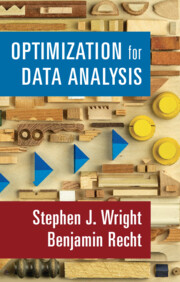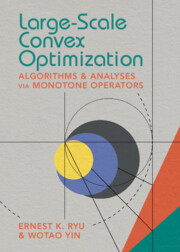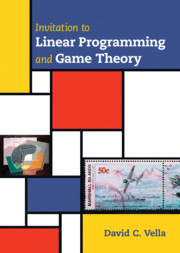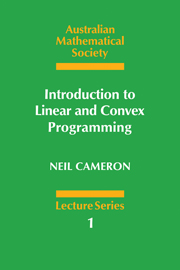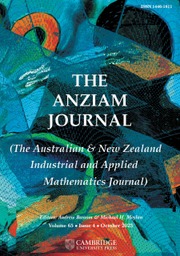Optimization for Data Analysis
- Authors:
- Stephen J. Wright, University of Wisconsin, Madison
- Benjamin Recht, University of California, Berkeley
- Date Published: April 2022
- availability: This ISBN is for an eBook version which is distributed on our behalf by a third party.
- format: Adobe eBook Reader
- isbn: 9781009020091
Find out more about Cambridge eBooks
Adobe eBook Reader
Other available formats:
Hardback
Looking for an inspection copy?
Please email [email protected] to enquire about an inspection copy of this book
-
Optimization techniques are at the core of data science, including data analysis and machine learning. An understanding of basic optimization techniques and their fundamental properties provides important grounding for students, researchers, and practitioners in these areas. This text covers the fundamentals of optimization algorithms in a compact, self-contained way, focusing on the techniques most relevant to data science. An introductory chapter demonstrates that many standard problems in data science can be formulated as optimization problems. Next, many fundamental methods in optimization are described and analyzed, including: gradient and accelerated gradient methods for unconstrained optimization of smooth (especially convex) functions; the stochastic gradient method, a workhorse algorithm in machine learning; the coordinate descent approach; several key algorithms for constrained optimization problems; algorithms for minimizing nonsmooth functions arising in data science; foundations of the analysis of nonsmooth functions and optimization duality; and the back-propagation approach, relevant to neural networks.
Read more- Focuses on optimization methods that are most commonly used in data science, data analysis, and machine learning
- Bridges the gap between texts on deterministic smooth optimization or convex optimization and the requirements for the fast-growing data analysis industry
- Aimed at advanced undergraduate and beginning graduate students studying data science and/or optimization, the text would be especially useful for an optimization course for students in statistics and machine learning
Reviews & endorsements
'This delightful compact tome gives the reader all the results they should have in their pocket to contribute to optimization and statistical learning. With the clean, elegant derivations of many of the foundational optimization methods underlying modern large-scale data analysis, everyone from students just getting started to researchers knowing this book inside and out will be well-positioned for both using the algorithms and developing new ones for machine learning, optimization, and statistics.' John C. Duchi, Stanford University
See more reviews'Optimization algorithms play a vital role in the rapidly evolving field of machine learning, as well as in signal processing, statistics and control. Numerical optimization is a vast field, however, and a student wishing to learn the methods required in the world of data science could easily get lost in the literature. This book does a superb job of presenting the most important algorithms, providing both their mathematical foundations and lucid motivations for their development. Written by two of the foremost experts in the field, this book gently guides a reader without prior knowledge of optimization towards the methods and concepts that are central in modern data science applications.' Jorge Nocedal, Northwestern University
'This timely introductory book gives a rigorous view of continuous optimization techniques which are being used in machine learning. It is an excellent resource for those who are interested in understanding the mathematical concepts behind commonly used machine learning techniques.' Shai Shalev-Shwartz, Hebrew University of Jerusalem
'This textbook is a much-needed exposition of optimization techniques, presented with conciseness and precision, with emphasis on topics most relevant for data science and machine learning applications. I imagine that this book will be immensely popular in university courses across the globe, and become a standard reference used by researchers in the area.' Amitabh Basu, Johns Hopkins University
Customer reviews
Not yet reviewed
Be the first to review
Review was not posted due to profanity
×Product details
- Date Published: April 2022
- format: Adobe eBook Reader
- isbn: 9781009020091
- availability: This ISBN is for an eBook version which is distributed on our behalf by a third party.
Table of Contents
1. Introduction
2. Foundations of smooth optimization
3. Descent methods
4. Gradient methods using momentum
5. Stochastic gradient
6. Coordinate descent
7. First-order methods for constrained optimization
8. Nonsmooth functions and subgradients
9. Nonsmooth optimization methods
10. Duality and algorithms
11. Differentiation and adjoints.
Sorry, this resource is locked
Please register or sign in to request access. If you are having problems accessing these resources please email [email protected]
Register Sign in» Proceed
You are now leaving the Cambridge University Press website. Your eBook purchase and download will be completed by our partner www.ebooks.com. Please see the permission section of the www.ebooks.com catalogue page for details of the print & copy limits on our eBooks.
Continue ×Are you sure you want to delete your account?
This cannot be undone.
Thank you for your feedback which will help us improve our service.
If you requested a response, we will make sure to get back to you shortly.
×
